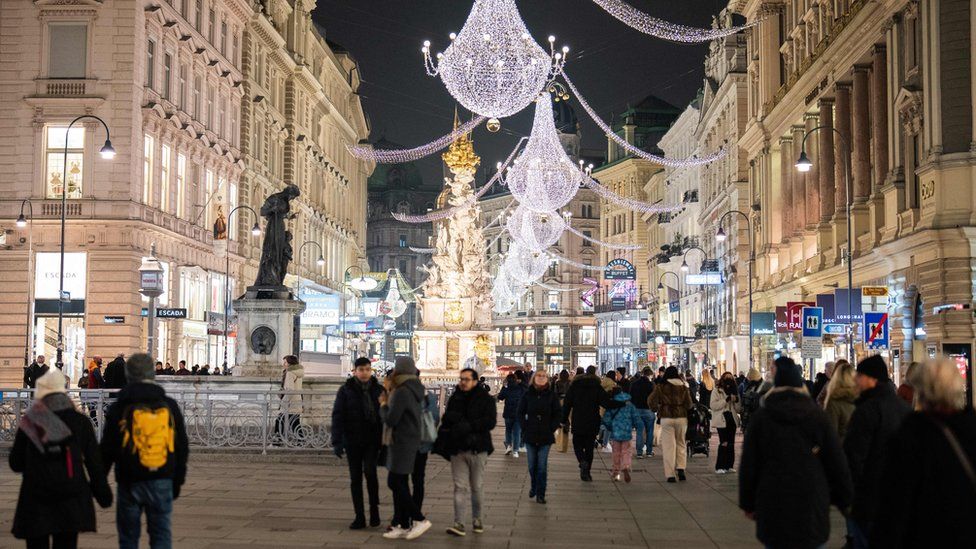
Austria goes into lockdown again for the unvaccinated. It is because of an increase in infections.
“We are not taking this step lightly, but unfortunately it is necessary,” Chancellor Alexander Schallenberg said.
Unvaccinated people will only be permissible to leave the house for specific reasons. Such as working or shopping.
Austria has one of the lowest vaccination rates in Western Europe, with only about 65 percent of the population fully immunized.
Meanwhile, the infection rate after seven days is over 800 cases per 100,000 persons, one of the highest in Europe.
Overall, Europe has once again become the pandemic’s worst-affected region, with some nations imposing restrictions and issuing warnings about rising cases.
Health authorities are appealing for laws like required facial coverings in crowds and enclosed locations to reinstate to avoid a winter crisis. The UK has one of the highest COVID-19 infection rates. Also, it has failed to implement restrictions.
In Austria, the lockdown implemented for the unvaccinated people on Monday in response to mounting pressure on the country’s hospitals will initially continue for ten days.
Exemptions will be there for children under the age of 12 and persons who have recently recovered from the infection.
“Our bodies, our freedom to decide”
Hundreds of people demonstrated outside the chancellery in Vienna’s capital over the weekend, brandishing placards that said, “Our bodies, our freedom to decide.”
One female demonstrator stated that she was there “to fight for my rights.” “It is totally discriminatory what is happening here,” she said.
Prof Eva Schernhammer of the Medical University of Vienna, on the other hand, thought the steps were necessary. He was citing the overcrowding in hospital intensive care units as an example. “It’s already projected that within two weeks we’ll have reached the limit,” she said.
Unvaccinated people already cannot go to restaurants, hair salons, and movie theaters. But they will now require to stay at home.
“In reality, we have told one-third of the population: you will not leave your home apart for certain reasons,” Mr. Schallenberg said.
“That is a massive reduction in contacts between the vaccinated and the unvaccinated.”
According to the government, police will conduct spot checks in public places to ascertain people’s vaccination status.
However, some have questioned whether the move is legal. The far-right Freedom Party has stated that it will form a second-class citizen group.
Vaccination rates

In neighboring Germany, Health Minister Jens Spahn has warned of an unvaccinated pandemic. The federal government and state officials will gather later this week to discuss possible new restrictions.
Germany’s immunization rate of 67.3 percent is somewhat higher than Austria’s, but not by much. Germany designated Austria as a high-risk area, requiring anyone arriving from the nation to undergo quarantine.
In reaction to a sharp surge in infections in the Netherlands, “lockdown-lite” measures are coming into existence to limit social contacts.
Restaurants and businesses will close early. Spectators cannot go to athletic events.
Approximately 84 percent of Dutch adults have received all of their vaccines. The majority of patients in Dutch hospitals have not received their vaccine.
Some eastern European countries have much lower vaccination rates.
In Latvia, 59 percent of the population is fully vaccinated. But still, it re-imposed lockdown this month. Thereby, barring MPs who refuse to take the vaccine from voting on bills or participating in debates until the middle of next year. Their wages will deduct as well.
According to Our World In Data, only roughly 35% of Russia’s population has been properly vaccinated. To combat infections, Moscow put stores, restaurants, and schools on partial lockdown at the end of October. Workers got a nine-day paid holiday.
Other countries are enacting regulations that only apply to the unvaccinated. Unvaccinated people will not be able to go to restaurants, pubs, and sporting activities in Queensland, Australia, starting on December 17th.
Singapore also stated that those who choose not to take vaccines will be responsible for their medical expenditures beginning in December.





